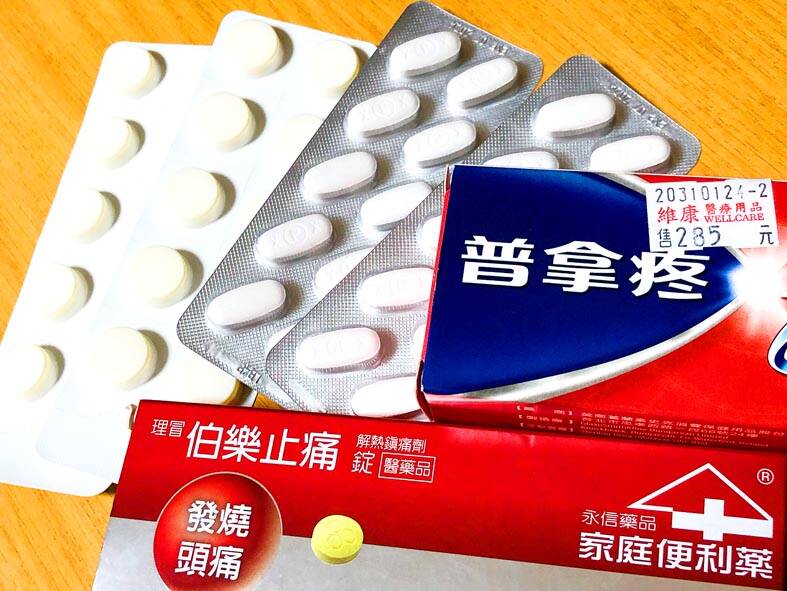Pharmacies might soon have to ask customers to limit their purchase of fever medication, as the Ministry of Health and Welfare yesterday said it is considering such a policy amid a drug shortage triggered by a massive COVID-19 outbreak in China.
Minister of Health and Welfare Hsueh Jui-yuan (薛瑞元) told the legislature’s Social Welfare and Environmental Hygiene Committee that it is paramount to ensure that Taiwan’s medical institutions have “sufficient amounts of medicines.”
Lawmaker urged Hsueh to take immediate action to tackle a severe shortage of paracetamol and other acetaminophen-based painkillers with fever-reducing properties that are widely used in Taiwan.

Photo: CNA
The lawmakers said they were concerned that the shortage would spill over to other fever drugs and painkillers if the government does not stop people from hoarding those drugs.
“Our No. 1 mission is to ensure that Taiwan’s medical institutions have sufficient amounts of medicines... We have asked pharmaceutical firms to first meet the demand from hospitals to ensure that they are not short of drugs for people seeking medical attention,” Hsueh said.
Hsueh said that the ministry is considering requiring pharmacies to ask their customers not to buy too many packages of the drugs at once.
However, the policy would be different from a cap on purchases, he added.
“We hope pharmacists across the country will help persuade customers not to buy too much over-the-counter antipyretics at a time,” he said. “We will closely monitor medical drug supply to determine whether stronger actions should be taken to control [the market]. Control measures will be lifted when supply becomes stable again.”
Hsueh said that the ministry still needs to discuss details with the Federation of Taiwan Pharmacists Associations, such as the recommended maximum amount for each purchase and when the measures should be implemented.
Aside from regulating purchases of acetaminophen, the ministry might also implement measures regarding other painkillers, such as ibuprofen, Hsueh said.
Food and Drug Administration Director Wu Shou-mei (吳秀梅) said that Taiwan has approximately 54 million courses of acetaminophen and 910,000 courses of ibuprofen.
The supply of chemicals could sustain local drugmakers’ production up to 10.6 months and five months respectively, Wu said.

Taiwanese actress Barbie Hsu (徐熙媛) has died of pneumonia at the age of 48 while on a trip to Japan, where she contracted influenza during the Lunar New Year holiday, her sister confirmed today through an agent. "Our whole family came to Japan for a trip, and my dearest and most kindhearted sister Barbie Hsu died of influenza-induced pneumonia and unfortunately left us," Hsu's sister and talk show hostess Dee Hsu (徐熙娣) said. "I was grateful to be her sister in this life and that we got to care for and spend time with each other. I will always be grateful to

REMINDER: Of the 6.78 million doses of flu vaccine Taiwan purchased for this flu season, about 200,000 are still available, an official said, following Big S’ death As news broke of the death of Taiwanese actress and singer Barbie Hsu (徐熙媛), also known as Big S (大S), from severe flu complications, the Centers for Disease Control (CDC) and doctors yesterday urged people at high risk to get vaccinated and be alert to signs of severe illness. Hsu’s family yesterday confirmed that the actress died on a family holiday in Japan due to pneumonia during the Lunar New Year holiday. CDC Deputy Director-General Tseng Shu-hui (曾淑慧) told an impromptu news conference that hospital visits for flu-like illnesses from Jan. 19 to Jan. 25 reached 162,352 — the highest

TAIWAN DEFENSE: The initiative would involve integrating various systems in a fast-paced manner through the use of common software to obstruct a Chinese invasion The first tranche of the US Navy’s “Replicator” initiative aimed at obstructing a Chinese invasion of Taiwan would be ready by August, a US Naval Institute (USNI) News report on Tuesday said. The initiative is part of a larger defense strategy for Taiwan, and would involve launching thousands of uncrewed submarines, surface vessels and aerial vehicles around Taiwan to buy the nation and its partners time to assemble a response. The plan was first made public by the Washington Post in June last year, when it cited comments by US Indo-Pacific Commander Admiral Samuel Paparo on the sidelines of the Shangri-La Dialogue

COMBINING FORCES: The 66th Marine Brigade would support the 202nd Military Police Command in its defense of Taipei against ‘decapitation strikes,’ a source said The Marine Corps has deployed more than 100 soldiers and officers of the 66th Marine Brigade to Taipei International Airport (Songshan airport) as part of an effort to bolster defenses around the capital, a source with knowledge of the matter said yesterday. Two weeks ago, a military source said that the Ministry of National Defense ordered the Marine Corps to increase soldier deployments in the Taipei area. The 66th Marine Brigade has been tasked with protecting key areas in Taipei, with the 202nd Military Police Command also continuing to defend the capital. That came after a 2017 decision by the ministry to station